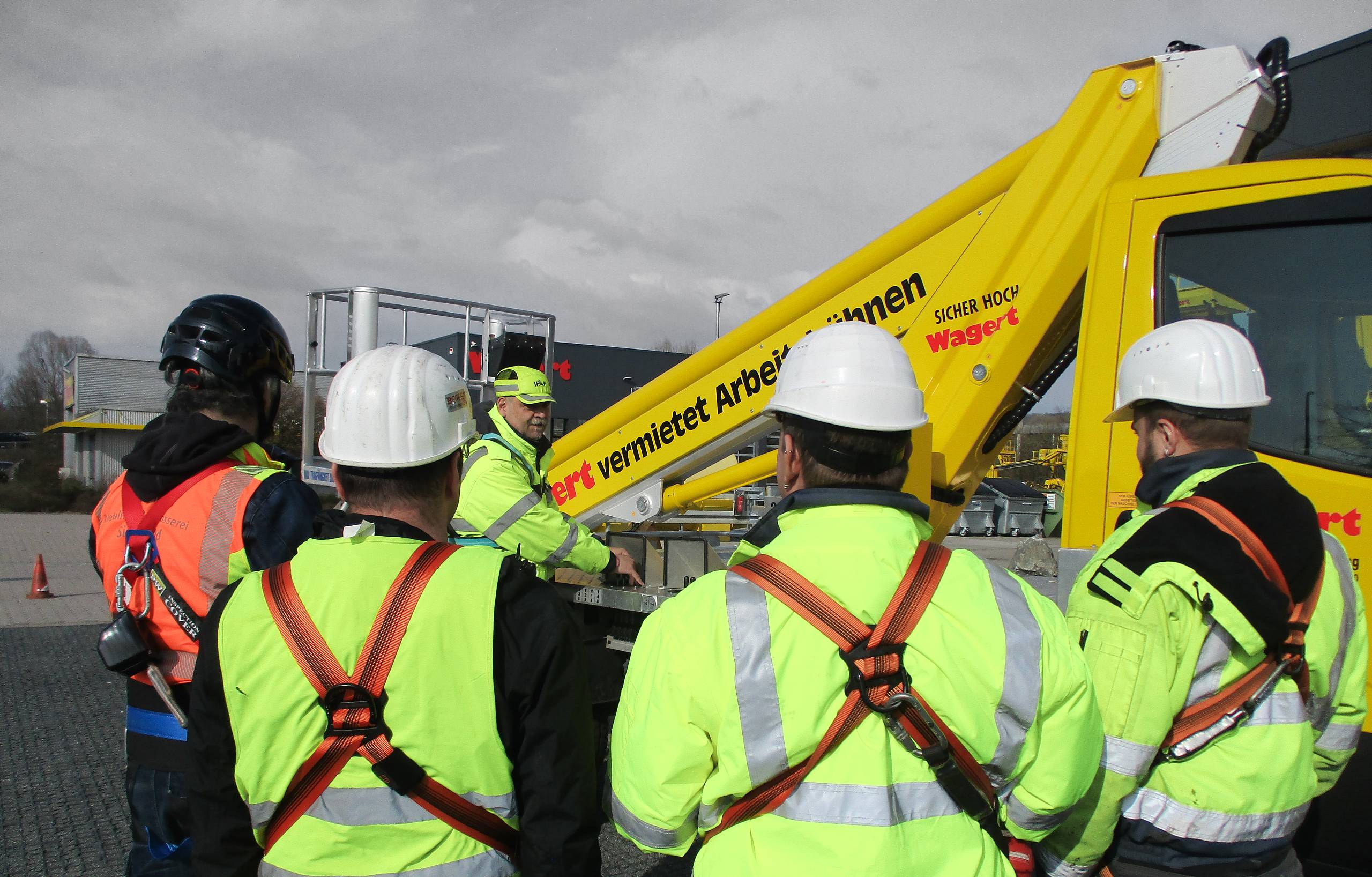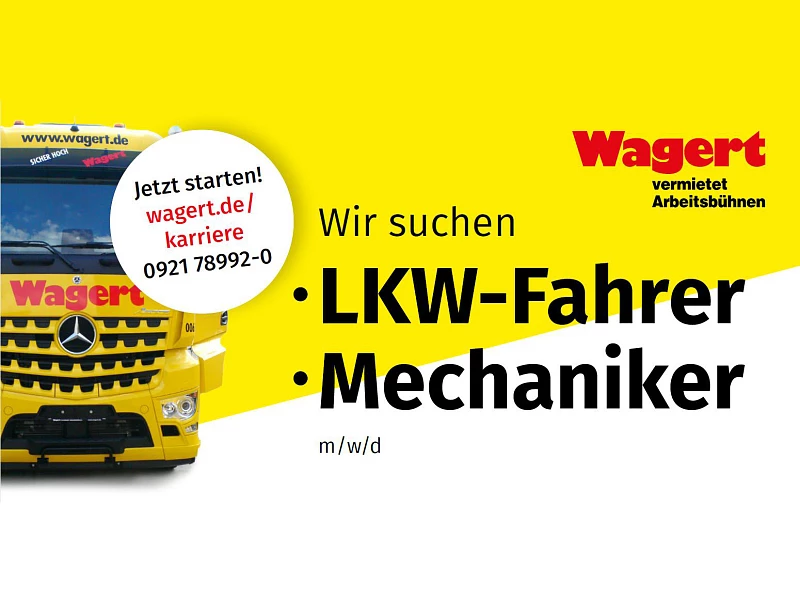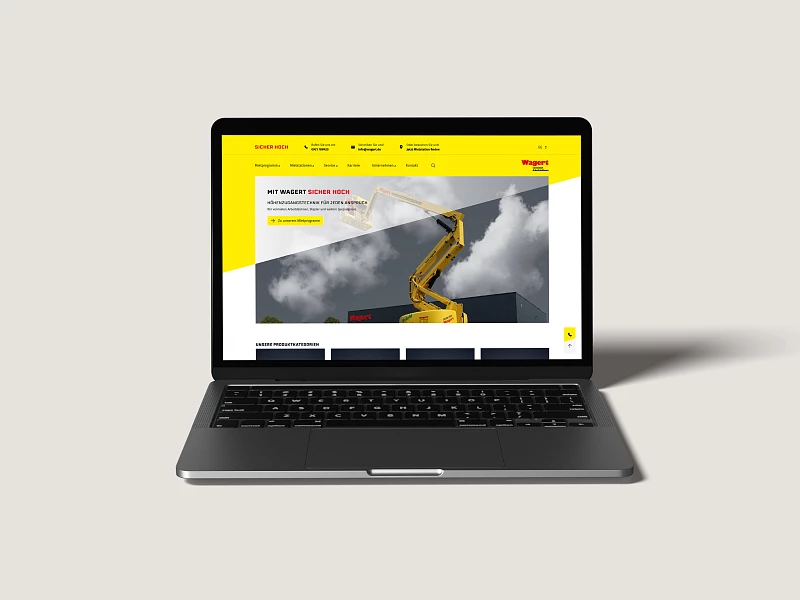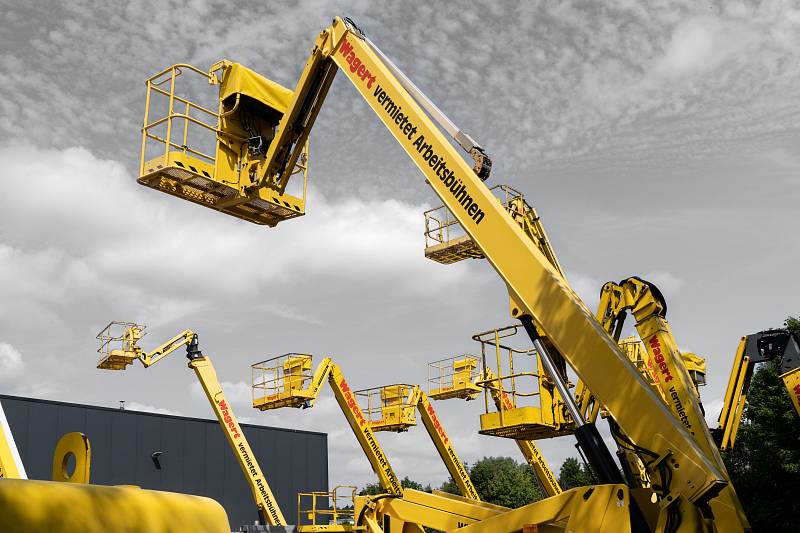
Wagert Training Centre
For the use of working platforms
Put your trust in the Wagert IPAF Training Centre. Our understanding of professionalism and safety in the use of working platforms is reflected in the professional training courses and safety instructions for working platforms that have been permanently carried out since the beginning of the 90s. We offer you and your employees the appropriate safety training and instruction for operating working platforms.
Employers are legally obliged to instruct their employees in the handling of work equipment (in this case: work platforms). We support you as an employer in providing evidence of this basic training in accordance with current legislation by means of so-called "IPAF training".
The training is a theoretical and practical basic training for the safe handling of work platforms.
Every employee who uses work equipment (here: work platforms).
The basic training must be carried out once. The employer is then still obliged to instruct his employees annually in accordance with the basic principles of occupational safety (DGUV 1). At international level, the entire basic training course must be repeated every 5 years.
The training usually lasts one day depending on the number of participants and the number of device categories.
All training participants receive a training certificate, a PAL card, safety guidelines and the IPAF logbook after passing the theory and practical examinations of the IPAF training course. The PAL Card is recognised worldwide and serves as proof of proper training.
Recognised training centre since 2005
Wagert has been an IPAF accredited training centre since 2005 and is therefore authorised to issue so-called PAL licences (a kind of safety-related driving licence for working platforms). The IPAF operator training course was the first in the world to receive TÜV certification to ISO 18878, familiarising participants with all the safety requirements for handling MEWPs. All courses comply with EU directives and train participants to be responsible and competent operators of MEWPs.
We show you how to get to the desired work site safely. Carelessness, superficiality, recklessness as well as the lack of compliance with elementary safety rules are the most frequent causes of accidents when using complex machines and technical equipment. Far too often, serious mistakes happen due to a lack of appropriate machine and operation training.
Registrations and queries
If you have any questions or would like to register for a training course, we will be happy to help you.
Phone: 0921 78992-0,
Fax: 0921 83126
E-mail: schulungen@wagert.de
Training dates on request only.
You can also use our IPAF registration form to register.
More information on IPAF training
Training is available in the following equipment categories:
- Static Vertical (1a):
Vertical passenger lifts (with supports) - Static Boom (1b):
Self-propelled boom lifts with outriggers, trailer lifts, truck lifts and track lifts - Mobile Vertical (3a):
Scissor lifts and vertical personnel lifts (movable from above). - Mobile Boom (3b):
Self-propelled articulated and telescopic personal lifts (movable from above).
Not sure which category you need?
Click here for a better overview of the equipment categories.
According to DGUV 1 (BGV A1) (accident prevention regulation "Principles of Prevention"), the Occupational Health and Safety Act (§12), DGUV 100-500 (BGR 500) (Chapter 2.10. Operating lifting platforms) and DGUV 308-008 (BGG/GUV-G 966) (Training and commissioning of operators of lifting platforms), the use of personnel on working platforms requires appropriate instruction and commissioning.
You can download the DGUV 308-008 principle - training and commissioning of operators of working platforms here.
Instruction is the training of employees in the safe use of their work equipment. This can be, for example, equipment or machines (working platforms, excavators, etc.). In this context, points of occupational health and safety law, as well as possible hazards and behaviour in the case of certain working methods or malfunctions caused by the work equipment, plant or machine must be communicated.
Instructionis not a briefing on a product or piece of equipment, but a detailed safety training on the working environment of an activity or product group (e.g. telescopic forklift, working platforms, excavators), it deals with the safety and health requirements in accordance with the legal occupational health and safety regulations.
The instruction must be repeated regularly. The repetition of the instruction is required by law after 12 months at the latest. If the employer cannot carry out this himself for certain reasons, he must commission appropriately skilled and competent training personnel (internal/external) with this issue. The employee must prove to the employer that he is capable of operating the device or machine. The employer must instruct the employee to operate machinery in writing.
Further information on the subject of instruction, training, briefing can be found on the website of the Bundesverband der Baumaschinen-, Baugeräte- und Industriemaschinenfirmen e.V. (Federal Association of Construction Machinery, Construction Equipment and Industrial Machinery Companies).
Instruction takes place when a machine is handed over, e.g. working platform, excavator, etc. An instruction is related to a defined type of equipment or machine, e.g. truck mounted platform L 220 K2 etc. Product-specific points and differences regarding safety and application (switch functions) must be addressed specifically for these working platforms. The operator is expressly informed that the operating instructions of the respective device must be observed and that he must familiarise himself with the machine himself!
Example:
A customer hires a working platform or a telescopic forklift from Wagert. We instruct the operator, the rental customer (for his employees) is responsible for the instruction. If he does not do this, he is at least negligent.
Further information on the subject of instruction, training and briefing can be found on the website of the Bundesverband der Baumaschinen-, Baugeräte- und Industriemaschinenfirmen e.V. (Federal Association of Construction Machinery, Construction Equipment and Industrial Machinery Companies).
- Legal principles and regulations
- Requirements for the operator
- Working safely
- Types and types
- Design, function and possible uses
- Dangers of incorrect use
- Behaviour in the event of accidents and emergency operation
- Ground conditions, stability and payload
- Working in windy and adverse weather conditions
- Choice of working area and correct stabilisation
- Daily visual and functional checks
- Training courses only take place online as standard
- Theoretical test
- Unit presentation and unit components
- Commissioning and daily checks
- Safe operation and driving
- Personal protective equipment (PPE)
- Practical test
The courses offered take place online as standard.
Dates on request.
News from Wagert

We are looking for new colleagues (m/f/d) for our various rental stations in Bavaria, Thuringia and Saxony.

Our modern rental park offers you the right solution for many different areas of application. Height access technology from professionals for your project.

Modern, fast, user-friendly and an individually filterable rental programme, plus FAQ and info texts. Our focus: you!
